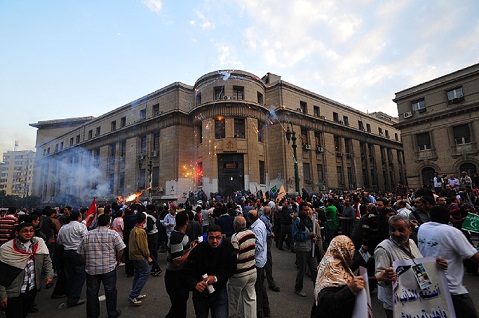
An anti-President Mohamed Morsy demonstration was attacked by a group of men on Saturday afternoon. The group, who had assembled outside the Court of Cassation to protest against Morsy’s recent constitutional declaration, chanted against Morsy and for an independent judiciary. Men who protested claimed to be Muslim Brotherhood members and Morsy sympathisers attempted to violently end the protest. The aggressors withdrew, but not before Central Security Forces launched tear gas to disperse civilians.
The number of protesters grew on 26 July Street next to the High Court, as security forces blocked the road between Ramses Street and the High Court.
Inside the High Court, the Judges’ Club addressed thousands supporters of Abdel Meguid Mahmoud, who was dismissed as general prosecutor by Morsy’s decree. Mahmoud’s appearance came after an emergency meeting in which the Judges’ Club said it rejected the president’s decision, claiming it interfered in the independence of the judiciary and sought to influence the political landscape in an unlawful manner. Supporters chanted “the people demand the downfall of the Supreme Guide” and “Illegitimate” in reference to Morsy’s decree.
Ahmed Al-Zind, head of the Judges Club, introduced Mahmoud as the “general prosecutor,” which was met with applause and cheering from those attending the assembly.
Mahmoud told his colleagues and supporters in his speech at the High Court was a “breach of the general principles of the constitution and the law.”
He also vowed to challenge Morsy’s decision in court.
A group of influential judges referring to themselves as the “current of independent judiciary” released a statement condemning the president’s decisions. “We were confident that maintaining the independence of the judiciary’s service was the starting point for achieving a state that respects the rule of law, and a genuine democratic state would be the foundation for the prosperity of the nation,” read the statement.
“The decisions included some of the demands of the masses, but unfortunately came at the expense of democracy and freedoms.”
The group presented four objections to the decree.
The statement objected to the decision to reopen cases against former regime officials, saying the decision “undermines the authority of the judiciary’s independence and safeguards, which are the guarantees of the nation and freedom of its children, and a waste of valuable judicial decisions will inevitably lead to a loss of public confidence in them.”
The group also expressed displeasure with the declaration that Morsy’s decisions could not be challenged by the judiciary. “The immunisation of political decisions, whether previous or subsequent, albeit for a limited period, is not expected to support democracy in any way because it will inevitably lead to the first steps on the road to tyranny, not freedom,” they said.
The statement also urged that any cleansing of the judiciary or seeking of stability should be done through the law and with respect to judicial rulings.
Judges in cities across Egypt, including Alexandria, Damanhour and Qalyubia declared on Saturday they would strike until Morsy reversed the parts of his decree that weaken the judiciary.
The president and his supporters claim the step was necessary to neutralise a corrupt judicial system ahead of its reform, so that it would not be an obstacle while the country prepares for a new constitution and subsequent parliamentary elections.



